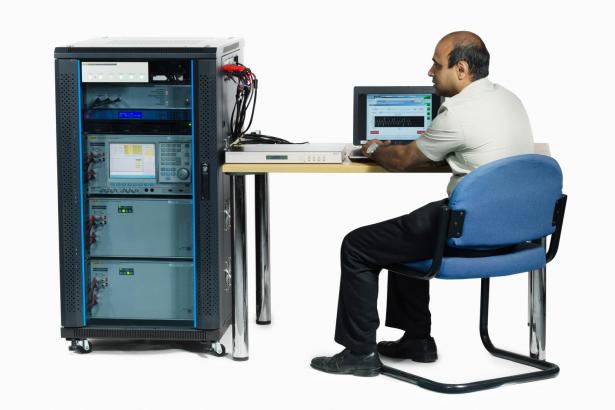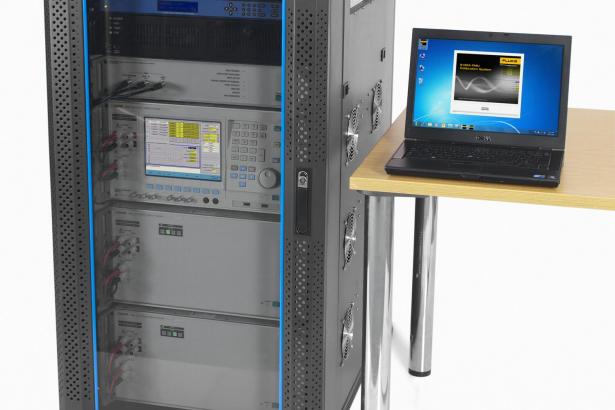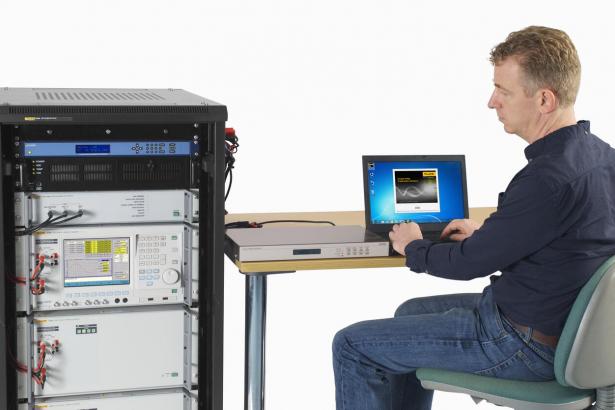6135A/PMUCAL Phasor Measurement Unit Calibration System
Product overview: 6135A/PMUCAL Phasor Measurement Unit Calibration System
The 6135A/PMUCAL system is made up of these hardware components, shipped in a 19-inch system rack with an integrated test connection panel:
- Three-phase 6135A Electrical Power Standard: Includes one 6105A Electrical Power Standard Master Unit and two 6106A Electrical Power Standard Auxiliary Units. Provides voltage and current stimuli to the PMU under test
- 6105A System Timing Unit: controls timing and synchronizes the tests done throughout the calibration system
- GPS receiver: supplies the 6135A/PMUCAL system and the PMU under test with a source of Universal Coordinated Time (UTC)
- Server PC: functions as a dedicated application controller, receiving commands from the client PC to control the calibration system
A user-supplied client PC is also required, separate from the server PC but connected via a common network.
Calibration software is the control interface to the 6135A/PMUCAL system, enabling you to configure the testing process and control the testing and calibration of the PMU under test. The software is also an advanced capability analysis tool for the test results. Two modes of operation are available. In Simulate Mode, the software operates without being connected to an actual PMU, but rather simulates the PMU responses in order to do test development, system training, or use the calibration software without actually being connected to a calibration system. The PMU Test Mode enables you to test a PMU and collect actual testing data.
With the software on a client PC, you can use it to:
- Fully test a PMU to the IEEE C37.118.1a-2014 standard with the pre-loaded suite of required tests
- Perform custom testing on a PMU to verify operation in ways not specifically required by the standard.
- Refer to test data for results and analysis
- Modify and create new testing procedures as needed
The test system architecture allows the client PC to access the test system over the Internet, from anywhere in the world. You can complete an automated PMU test in approximately six to eight hours per PMU configuration (frequency, sample rate, class), compared with many days using manual techniques. And the initial setup is also fast – less than an hour of user interaction is required at the beginning of the automated test.
System accuracy yields a typical test accuracy ratio of 40:1 against the the IEEE C37.118.1a-2014 measurement requirements.
Creating reports with the 6135A/PMUCAL system is flexible and convenient. Pre-configured reports are included with the system to help you minimize creation time. Use these reports “as is” or as templates that you customize to meet your specific needs.
6135A Electrical Power Standard Three-Phase System
The 6135A Electrical Power Standard Three Phase System at the heart of the PMU calibration system can be operated in standalone mode, independent of the 6105A System Timing Unit and the server PC. The 6135A sets a new benchmark for accuracy in electrical power calibration standards. Voltage and current are generated with up to six digits precision and accuracies better than 0.005% (50 ppm). Phase adjustment provides for 1 milli-degree or 10 micro-radian resolutions. Phase performance is exceptional, with voltage to current phase accuracy to 2.3 milli-degrees for the 6105A. Voltage-to-voltage phase accuracy is 5 milli-degrees.
Use the 6135A to generate a wide variety of complex signals, including flicker; harmonics; dips and swells; interharmonics; fluctuating harmonics; simultaneous application.
This feature gives you enormous flexibility to calibrate a wide workload of electrical power test instruments, including:
- AC voltmeters
- AC ammeters
- Current transformers
- Flicker meters
- Phase angle meters
- Power factor meters
- Power analyzers
- Power recorders
- Power transducersrelay testers
- VA meters
- VAR meters
- Voltage transformers
- Wattmeters (3- or 4-wire)
- Watthour meters
- and more
Specifications: 6135A/PMUCAL Phasor Measurement Unit Calibration System
| Client PC requirements | |
| Microsoft Windows 7 or later operating system Microsoft Excel 2003 or later 2 GHz processor 2 GB RAM 20 GB free hard disk storage space for program and data Network connection at > 300 KB/s 32X DVD drive to install calibration software |
| Electrical Source Accuracy Specifications | |
| See specifications in the 6100B/6105A Users Manual. | |
| Output voltage, per phase | 1008 V |
| Output current, per phase | 21 A |
| Output current compliance | 9 V |
| Output frequency range | 16 Hz – 6 kHz |
Performance Specifications for C37.118.1a-2014 Tests
| Parameter | TVE (%) | FE (Hz) | RFE (Hz/s) |
| Steady state | 0.1 | 0.0005 | 0.001 |
| Dynamic, modulation | 0.3 | 0.001 | 0.02 |
| Dynamic, ramp | 0.1 | 0.0005 | 0.01 |
PMU Test: Limits to Range of Influence Quantities General Test Limits
| Influence Quantity | Range (voltage) | Range (current) |
| PMU nominal frequency | 50 Hz or 60 Hz | 50 Hz or 60 Hz |
| PMU nominal magnitude | 10 V to 240 V | 0 A to 10 A |
| Signal magnitude (percent of PMU nominal) | 10 % to 120 % | 10 % to 200 % |
| Signal frequency range | 44.0 Hz to 65.9 Hz | 44.0 Hz to 65.9 Hz |
| Test duration (single test) | 1 to 65,535 seconds | 1 to 65,535 seconds |
Steady State Tests
| Influence Quantity | Range |
| Phase angle | ±180 ˚ |
| Harmonic distortion - harmonic order1 | 2 to 100 |
| Harmonic distortion - harmonic index 2 | 0 % to 40 % |
| Out of band interference frequency | 5 Hz to 180 Hz |
| Out of band interference magnitude (percent of PMU nominal voltage) 3 | 0 % to 40 % |
| Notes: | 1 Maximum harmonic frequency is 6 kHz. |
| 2 Within the 6135a amplitude/frequency profile limits. See the the 6100B/6105A user’s manual for details. | |
| 3 Limited to 30% of 6135A range setting. See the 6100B/6105A user’s manual for details. |
Modulation Tests
| Influence Quantity | Range |
| Signal magnitude | 100 % of PMU nominal voltage/current |
| Signal phase angle | ±180 ˚ |
| Modulation frequency | 0.1 Hz to 12 Hz |
| Amplitude modulation index | 0 to 0.1 |
| Phase modulation index (radians) | 0 to 0.1 radians |
| Settling time | 0 to 10 seconds |
Frequency Ramp Tests
| Influence Quantity | Range |
| Signal magnitude | 100 % of PMU nominal voltage/current |
| Frequency ramp | 44.0 Hz to 65.9 Hz |
| Ramp rate | 0.1 Hz/s to 6 Hz/s |
| Phase shift | ±180 ˚ |
| Transition time | 0 to 255 reports |
Input Step Change Tests
| Influence Quantity | Range |
| Signal magnitude | 100 % of PMU nominal voltage/current |
| Frequency | 44.0 Hz to 65.9 Hz |
| Phase shift | ±180 ˚ |
| Amplitude step magnitude1 | 0 to ±50 % |
| Delay before step | 255 seconds |
| Number of steps 2 | 1 to 40 |
| Notes: | 1 Positive amplitude step cannot exceed the 6135A range limit. See the the 6100B/6105A user’s manual for details. |
| 2 PMU response and delay times are small relative to PMU reporting intervals so multiple steps are staggered to increase the resolution of the measurement. |
General Specifications
| Input Power | |
| Voltage | 100 V to 240 V with up to ±10 % fluctuations |
| Frequency | 47 Hz to 63 Hz |
| Maximum consumption | 3,500 VA Max |
| Dimensions | |
| Height | 1,170 mm (46 in) |
| Width | 600 mm (24 in) |
| Depth | 800 mm (32 in) |
| Weight | 170 kg (374 lb) |
| Weight in shipment crate | 210 kg (462 lb) |
| Environment | |
| Warm-up time | 1 Hour |
| Temperature and performance: | |
| Operating | 5 °C to 35 °C |
| Storage | 0 °C to 50 °C |
| Transit temperature range and limited time transit conditions | 0 °C to 50 °C. Transit outside this temperature range (-20 °C to 0 °C, or 50 °C to 60 °C) must be limited to <100 hours |
| Relative humidity: | |
| Operating | <80 % 5 °C to 30 °C ramping down linearly to 50 % at 35 °C |
| Storage | <95 %, non-condensing 0 °C to 50 °C |
| Operating altitude | 0 m to 2,000 m |
| Storage altitude | 0 m to 12,000 m |
| Standard and Agency Approvals | |
| Safety | Complies with IEC 61010-1, overvoltage category II, Pollution degree 2 |
| EMI/RFI/EMC | IEC 61326-1: Controlled EM environments, FCC part 15 sub-part B class A |



